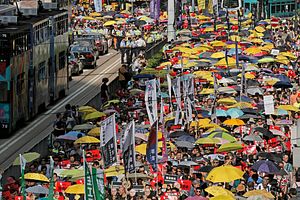Thousands of protesters marched through downtown Hong Kong on April 28 in opposition to changes to an extradition law widely seen as eroding the territory’s independent legal system.
Hong Kong police said around 22,800 people took part in Sunday’s protest at its peak period. Protest organizers put the figure at 130,000 protesters.
Many of those taking part carried yellow umbrellas, recalling Hong Kong’s massive 2014 pro-democracy protests, the leaders of whom have been sentenced to up to 16 months in prison. Sunday’s march was the largest demonstration in Hong Kong since the “Umbrella Movement” of 2014.
Participants carried placards accusing Hong Kong leader Carrie Lam of “selling out” the territory, and called on her to resign.
Revisions to the law would make it easier to send criminal suspects to mainland China, where they could face vague national security charges and unfair trials. Those concerns are especially powerful in Hong Kong, which is a part of China but prizes its independent legal and judicial systems. Many fear Hong Kong’s rule of law is already under siege – the city has seen several cases of Hong Kong residents going missing, only to reappear to face criminal charges on the mainland.
“Hong Kong and China have completely different legal systems,” said marcher Roland Lo, 49. “Creating a loophole that could mean a Hong Kong person gets extradited to China to face prosecution there, that completely destroys the guarantee of human rights and legal protection of one country, two systems.”
Under that system, Hong Kong was guaranteed the right to retain its own social, legal and political systems for 50 years following its handover from British to Chinese rule in 1997.
Another marcher, Amanda Wong, 40, said it was important to exercise those rights while they were under perceived attack.
“We have to come out to march. It doesn’t matter if we can change the situation or not, we just have come out while we still have the chance,” she said.
Business, legal, human rights, and journalists groups have expressed concerns over the proposed changes, saying they will damage Hong Kong’s reputation for legal independence.
The amendments expand the scope for the transfer of criminal suspects to China and remove the legislature’s right to scrutinize individual extradition decisions filed by Hong Kong’s chief executive.
By the Associated Press, with additional reporting by The Diplomat.

































